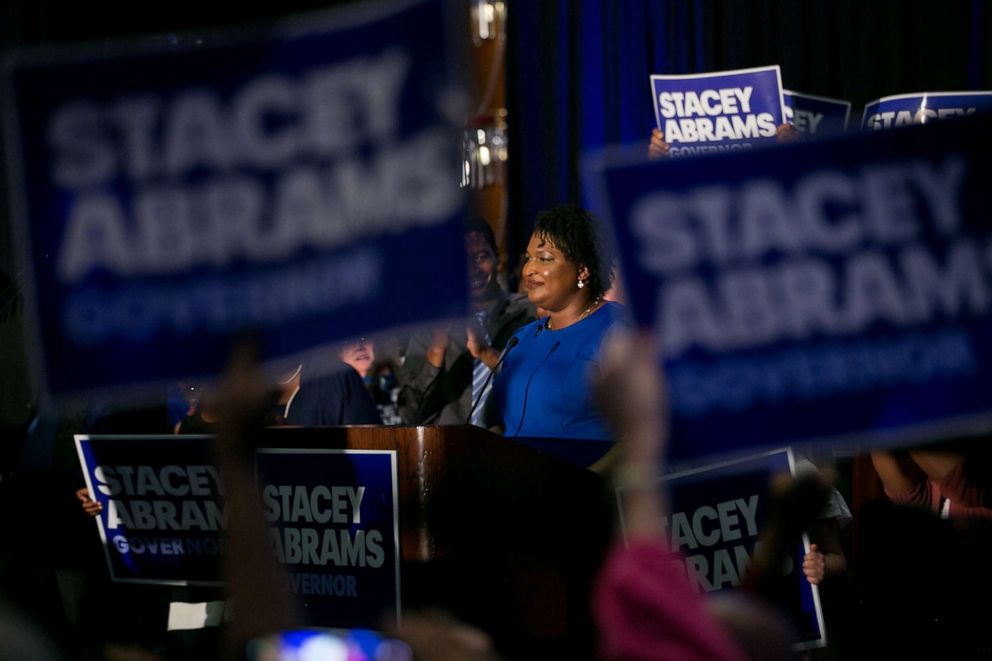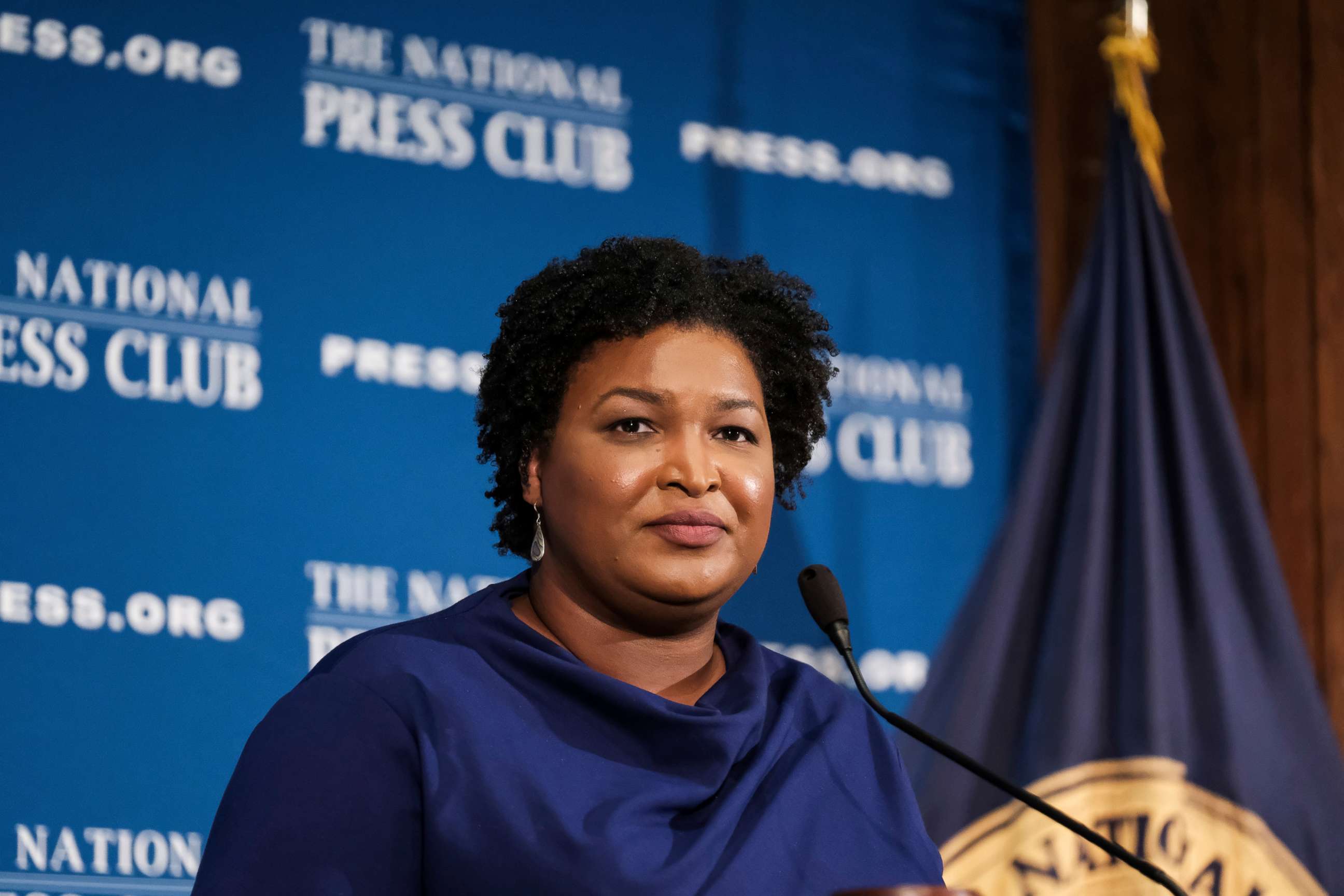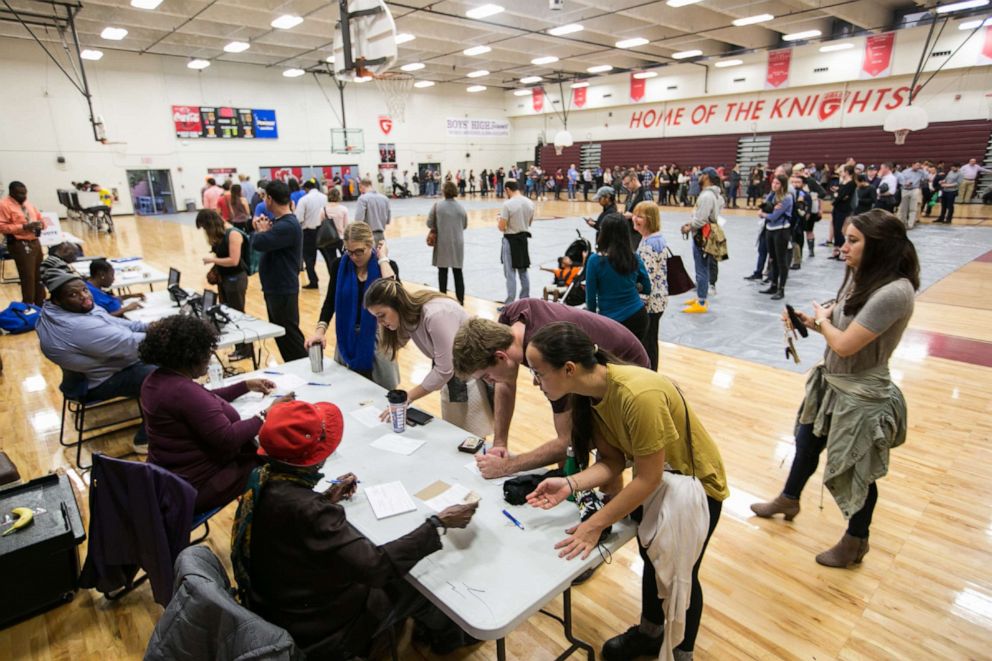Spotlight on Stacey Abrams, voter suppression as Democrats set to debate in Georgia
Abrams, still ruling out a presidential run, will be at Wednesday's debate.
Democrat Stacey Abrams may not have won Georgia's 2018 gubernatorial election, but her historic campaign, which uniquely took on voter suppression, pushed her to launch a 2020-focused initiative within her organization Fair Fight, to continue her campaign for voters' rights with enough time to make an impact ahead of the next election in not just Georgia, but in 20 states across the country.
"It was designed to think about the fact that voter suppression exists today, but often campaigns and parties don't think about it until September of the general election. And by then it's too late," Abrams said of Fair Fight 2020 at the National Press Club in Washington Friday. "Once you know more, you can do more."
With the fifth Democratic primary debate set to take place at 9 p.m. on Wednesday from the Tyler Perry Studios in Atlanta, there's a renewed focus on the reliably Republican state where Abrams was able to turn out voters in 2018 like no Democrat ever had before. Abrams never officially conceded that race and her gubernatorial run's legacy is also the work her campaign did to guarantee people could cast a ballot.

Abrams, who will be attending the debate, "lobbied vigorously" to have a debate held in "The Peach State," and while the media co-hosts -- MSNBC and The Washington Post -- get to choose what questions to ask, she "has been clear that any conversation in Georgia must include protecting Georgians’ right to vote," said Seth Bringman, a spokesman for Fair Fight.
Wendy Weiser, vice president for the nonpartisan Brennan Center for Justice's Democracy Program, told ABC News that given Georgia's status as "a hotbed of controversies around vote suppression" for more than a decade, this is the time for the 10 candidates debating on stage to take on this issue.
"It's a really important opportunity... for candidates to take stock and to commit to putting in place reforms, so that... it doesn't matter who it is that’s in office and who it is that's running the election, that there are fair ground rules that every American can count on," Weiser said. "It would be a really missed opportunity for the candidates not to commit to that, and not to make that a priority."
In late October, Georgia's secretary of state announced its office would be -- "as required by law" -- purging the state's voter rolls by 4%.
"Election security is my top priority,” Secretary Brad Raffensperger said in a press release. “Accurate and up-to-date voter rolls are vital to secure elections."
The list has more than 313,000 names on it, and the names on it have 30 days to respond.
On Friday, Abrams told National Press Club attendees that she didn't think all of those names should be removed from the rolls.
"Given past as precedent, we don't believe they're accurate," she said.
By the election day in 2018, her opponent, then-Secretary of State Brian Kemp, "had overseen a systematic purge of 1.4 million voters," Abrams said. The Brennan Center's analysis of data from 2016 to 2018 showed that Georgia had removed over 10% of its registered voters from the rolls.

Secretaries of state have the authority, and are required by law, to maintain voter rolls by removing people who have died and who have moved out of the jurisdiction, said Carol Anderson, chair of African American Studies at Emory University in Atlanta and the author of, "One Person, No Vote: How Voter Suppression is Destroying Our Democracy."
What she takes issue with, however, is purging what are called "inactive" voters, a so-called "use it or lose it" policy. In Georgia, that means anyone who skipped out on voting in just two general elections without having any contact with the state's election office can be purged from the rolls.
"I look at it this way: Simply because I haven't gone to church in a while, doesn't mean that I've lost my right to religion," Anderson said, telling ABC News that people with irregular voting tendencies tend to be poor people, communities of color and young people.
"So, if you take that group, and you begin to remove them from the polls simply because they haven't voted, you're able to shape the electorate," she said.
In October 2018, Kemp told ABC News, "There is no purging... That word purging is outrageous. When people don’t participate in over seven years, they end up coming on off the list per federal law."
Abrams is challenging the constitutionality of that policy, and of other election laws in Georgia, in a lawsuit filed in November 2018.
But legal action is a slow process, and Fair Fight 2020 is a $5 million program focused on what can be done right now by equipping state Democratic parties with the ability "to actually fight back" against efforts to suppress voter turnout.
Fair Fight 2020 is equipping state parties with what it calls "voter protection teams." The exact duties of these teams, which are hired by, trained by and funded by Abrams' organization, vary based on each state's specific needs and laws, but in general, they work to ensure that everyone who has the right to vote is able to cast a vote come election day. They do everything from being a body in the poll precinct monitoring what's happening on election day to answering questions on a voter protection hotline, Bringman told ABC News.

On at least one election law, Georgia is ahead of the curve, as one of only 17 states (and the District of Columbia) to have automatic voter registration. Bringman said while this expands the number of registered voters, it's only the start of a conversation.
"Being on the rolls is just the first step. Voters must be engaged and mobilized, and that means making sure voters are seen and heard," he said, noting that in 2018, Abrams' "bold, values-based message" was "backed up by a robust organizing operation."
Weiser, of the Brennan Center, said automatic voter registration does two key things. The first is getting on a list that can then be targeted by campaigns and groups working to mobilize voters to participate in elections. She said that research shows individual outreach "significantly improves participation rates."
But beyond that, being registered to vote can change one's perspective.
"They're now identified as a voter, as somebody who should be voting," she said, and behavioral scientists "expect that that's going to change behavior over time... that that will be their default assumption about themselves."
Still, she stressed that having nationalized "ground rules" regarding elections -- like a set number of early voting days, automatic voter registration and audited voting machines, among other standards -- are needed to really address voter suppression in the United States.
Anderson, of Emory, said she expects more attempts to suppress the vote ahead of the 2020 election, warning that it may not be as overt as it once was, but the incremental restrictions can have a large impact.
"The thing is that all of this is so subtle and so bureaucratic that it's not like that kind of cataclysmic violence that we saw on the Edmund Pettus Bridge in 1965 in Selma," she said. "So we don't see the carnage, but I call that a quiet civic death that is happening to American citizens."




